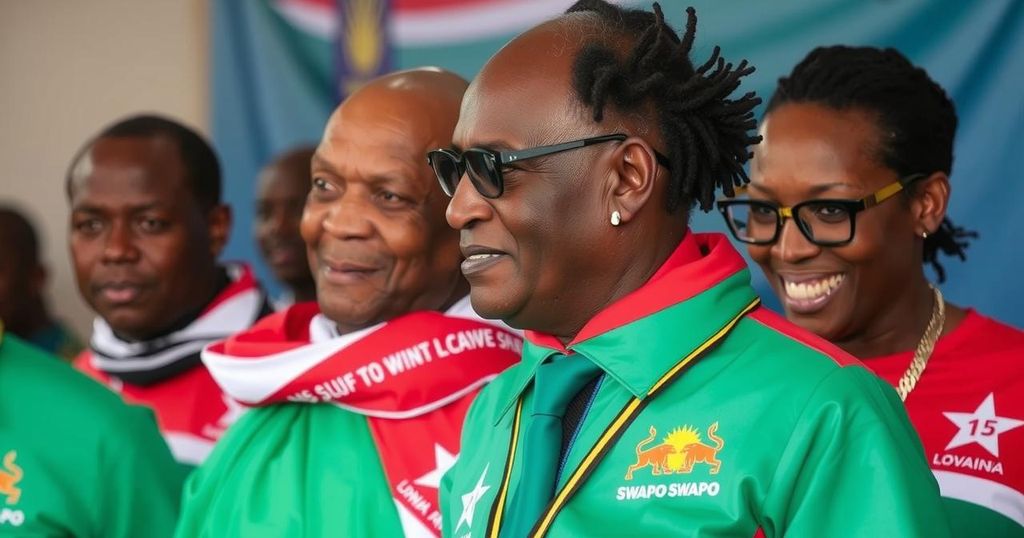World news
AFRICA, ALLIANCE DU CHANGEMENT, ALLIANCE LEPEP, BDP, BOTSWANA DEMOCRATIC PARTY, DEMOCRACY, ELECTIONS, GOVERNANCE, GOVERNMENT, MAURITIUS, MILITANT SOCIALIST MOVEMENT, NAMIBIA, NET, NETUMBO NANDI - NDAITWAH, OPPOSITION, PARLIAMENTARY SEATS, PR, PRAVIND JAGNAUTH, SAHARAN AFRICA, SWAPO
Daniel O'Connor
0 Comments
Namibia Elections Highlight Trend of Electoral Setbacks for African Ruling Parties
In Namibia, the governing party Swapo has lost significant parliamentary seats while retaining the presidency, amidst a year characterized by substantial electoral setbacks for ruling parties across sub-Saharan Africa. Voter dissatisfaction driven by economic woes and corruption has empowered opposition movements, resulting in unprecedented victories for opposition parties. This trend underscores a shift towards a more resilient democratic engagement among citizens, despite a global rise in authoritarianism.
Namibia’s ruling party, Swapo, has maintained its power for over three decades but has encountered significant challenges amid recent elections. Although Netumbo Nandi-Ndaitwah won the presidency with 57% of the vote, the Swapo party endured unprecedented losses in the parliamentary elections, shedding 12 out of its 63 seats. This pattern reflects a broader trend across sub-Saharan Africa, where incumbent parties are facing severe electoral setbacks due to growing public dissatisfaction with governance, corruption, and economic mismanagement. Citizens have exhibited heightened intolerance towards these issues, allowing for the emergence of united and dynamic opposition movements that have successfully challenged long-standing hierarchies.
The electoral losses highlight a significant shift in the political landscape, exemplified by the comprehensive defeat of the Botswana Democratic Party, which went from 38 seats to merely four, and in Mauritius, where the governing party collapsed to just two seats amidst a sweeping opposition victory. With citizens rallying against corruption and economic difficulties, the trend of incumbent parties facing electoral defeat is anticipated to persist beyond 2024. This trend stands in stark contrast to the global rise in authoritarianism, showcasing Africa’s resilience and a burgeoning appetite for democratic governance. Citizens and civil society are increasingly mobilized to demand accountability, suggesting that despite entrenched authoritarian regimes, there remains a vibrant spirit of resistance in the continent’s political arena.
The recent elections in Namibia and across sub-Saharan Africa mark a turning point in the political dynamics of the region, where incumbent parties have historically maintained control for extended periods. Factors contributing to the dissatisfaction among voters include economic downturns, rising corruption levels, and diminished public trust in governance. These challenges have empowered opposition parties to unite and effectively campaign against longstanding ruling parties, underscoring a demand for change that resonates deeply within the citizenry. The notable electoral outcomes observed in 2024 reflect a broader desire for accountability and democratic participation among the populace.
The dynamics of the 2024 elections across sub-Saharan Africa indicate a transformative period for the region, where once-dominant ruling parties are encountering electoral resistance fueled by public frustration over governance issues. The performance of Swapo and other ruling parties illustrates that discontent can alter political landscapes, fostering a climate conducive to opposition victories. Such developments reveal a significant evolution toward a more vibrant and competitive political environment, suggesting that Africa possesses a greater democratic resilience than previously assumed. Civil society and the electorate play crucial roles in demanding accountability and fostering change in the political sphere.
Original Source: www.bbc.com




Post Comment